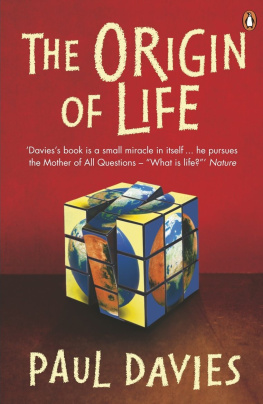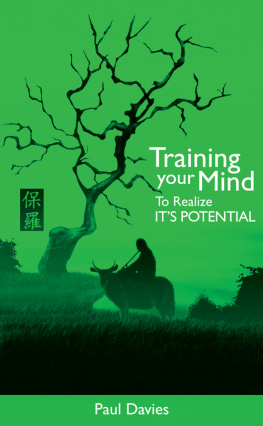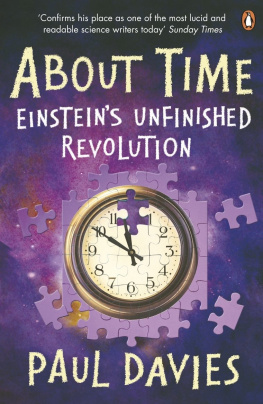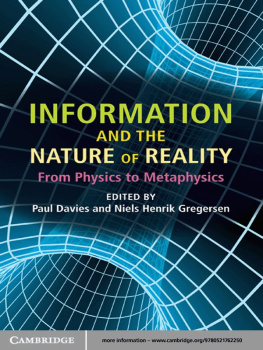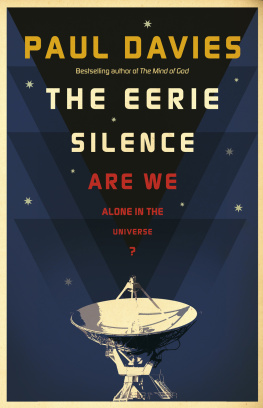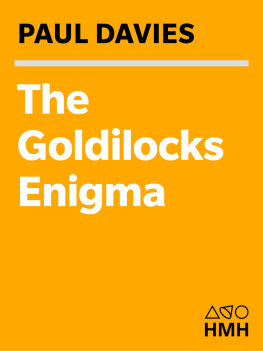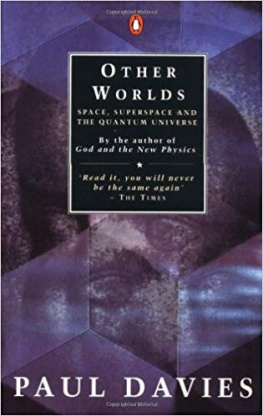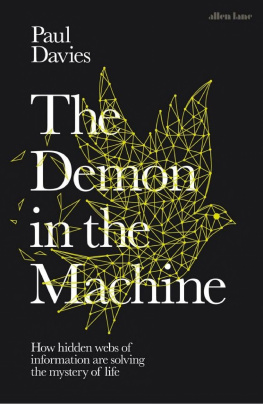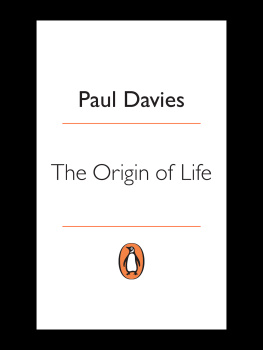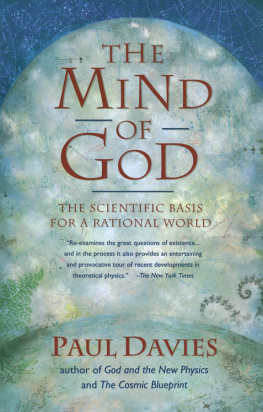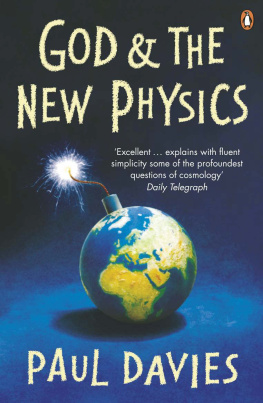Paul Davies - The Origin of Life
Here you can read online Paul Davies - The Origin of Life full text of the book (entire story) in english for free. Download pdf and epub, get meaning, cover and reviews about this ebook. year: 2006, publisher: Penguin Books Limited, genre: Religion. Description of the work, (preface) as well as reviews are available. Best literature library LitArk.com created for fans of good reading and offers a wide selection of genres:
Romance novel
Science fiction
Adventure
Detective
Science
History
Home and family
Prose
Art
Politics
Computer
Non-fiction
Religion
Business
Children
Humor
Choose a favorite category and find really read worthwhile books. Enjoy immersion in the world of imagination, feel the emotions of the characters or learn something new for yourself, make an fascinating discovery.
- Book:The Origin of Life
- Author:
- Publisher:Penguin Books Limited
- Genre:
- Year:2006
- Rating:3 / 5
- Favourites:Add to favourites
- Your mark:
- 60
- 1
- 2
- 3
- 4
- 5
The Origin of Life: summary, description and annotation
We offer to read an annotation, description, summary or preface (depends on what the author of the book "The Origin of Life" wrote himself). If you haven't found the necessary information about the book — write in the comments, we will try to find it.
The Origin of Life — read online for free the complete book (whole text) full work
Below is the text of the book, divided by pages. System saving the place of the last page read, allows you to conveniently read the book "The Origin of Life" online for free, without having to search again every time where you left off. Put a bookmark, and you can go to the page where you finished reading at any time.
Font size:
Interval:
Bookmark:
PENGUIN BOOKS
THE ORIGIN OF LIFE
Paul Davies is an internationally acclaimed physicist, writer and broadcaster, who holds the position of Professor of Natural Philosophy in the Australian Centre for Astrobiology at Macquarie University, Sydney. He has held previous academic appointments at the Universities of Cambridge, London, Newcastle upon Tyne and Adelaide. His research interests are in the fields of cosmology, quantum field theory and astrobiology. He is the author of over twenty books, including The Mind of God, About Time and How to Build a Time Machine.
Davies's talent as a communicator of science has been recognized in Australia by an Advance Australia Award and two Eureka Prizes, and in the UK by the 2001 Kelvin Medal and Prize by the Institute of Physics, and the 2002 Faraday Prize by the Royal Society. For his contributions to the deeper implications of science, Davies received the Templeton Prize in 1995.
Paul Davies

PENGUIN BOOKS
PENGUIN BOOKS
Published by the Penguin Group
Penguin Books Ltd, 80 Strand, London WC2R 0RL, England
Penguin Putnam Inc., 375 Hudson Street, New York, New York 10014, USA
Penguin Books Australia Ltd, 250 Camberwell Road, Camberwell, Victoria 3124, Australia
Penguin Books Canada Ltd, 10 Alcorn Avenue, Toronto, Ontario, Canada M4V 3B2
Penguin Books India (P) Ltd, 11, Community Centre, Panchsheel Park, New Delhi 110 017, India
Penguin Books (NZ) Ltd, Cnr Rosedale and Airborne Roads, Albany, Auckland, New Zealand
Penguin Books (South Africa) (Pty) Ltd, 24 Sturdee Avenue, Rosebank 2196, South Africa
Penguin Books Ltd, Registered Offices: 80 Strand, London WC2R 0RL, England
www.penguin.com
First published as The Fifth Miracle by Allen Lane The Penguin Press 1998
Published in Penguin Books 1999
Reissued 2000
Reprinted, with updates, under the present title 2003
Copyright Orion Productions,1998, 2003
copyright Karl Stetter, 1998
copyright Novartis Foundations, 1998
All rights reserved
The moral right of the author has been asserted
978-0-14-194183-7
In memory of Keith Runcorn
A pivotal event in the history of science came in 1859 with the publication by Charles Darwin of his opus On the Origin of Species. that it seems almost a miracle, so many are the conditions which would have to be satisfied to get it going.
In a nutshell, the problem is this. How did a mixture of lifeless atoms subject to blind and purposeless forces assemble themselves into something as awesomely complex as even the simplest microbe? Where and when did this momentous event take place? Did it happen only once in the universe, the result of a bizarre chemical fluke, or are the laws of nature inherently bio-friendly, implying that life will emerge wherever in the universe there are earthlike planets?
Belief that life is deeply etched into the laws of nature carries a faint echo of a bygone religious age, of a universe designed for habitation by living creatures. Many scientists are scornful of such notions, insisting that life's beginning was a freak accident of chemistry, unique to Earth, and that the subsequent emergence of complex organisms, including conscious beings, is likewise purely the chance outcome of a gigantic molecular If de Duve is right, the universe will be teeming with life.
There is a lot at stake in this debate, for it concerns the very place of mankind in the cosmos whether or not we are alone and where we fit into the grand scheme of things. It also has implications for technology. If life emerges readily, there is a good chance we shall be able to make it from scratch in the laboratory; many biochemists are currently busy trying to do just that. Novel life forms might revolutionize biotechnology and molecular biology. They could also pave the way to terra-forming other planets making them more like Earth perhaps eventually making them suitable for human habitation. Creating life in a test tube would also go a long way to removing the shroud of mystery over how it began naturally.
The study of life's origin and distribution in the universe forms part of the subject known as astrobiology. Scientists increasingly recognize that the story of life is not confined to our planet, but extends into interplanetary and even interstellar space. The holy grail of astrobiology is to identify a second genesis another planet where life has arisen independently. By common consent Mars offers the best hope for finding life beyond Earth, though within our solar system Europa, a moon of Jupiter, is increasingly seen as a promising candidate too. Mars is currently the subject of intense astrobiological research, and the destination of many current and planned space missions. Although it is a freeze-dried desert today, in the past it was warm and wet, and not dissimilar to Earth. Four billion years ago, Mars may even have offered a more favourable habitat for life than our own planet.
Indeed, it is not clear that terrestrial life actually started here on Earth. In the early 1990s Jay Melosh, of the University of Arizona, and I independently suggested that live microbes might be conveyed inside rocks blasted off planets by asteroid and comet impacts. Some of these rocks could find their way to neighbouring planets and implant life there. In particular, rocks ejected from Mars might bring Martian microbes to Earth, perhaps seeding our planet with its first life forms. If so, we could all be descended from Martians! Conversely, terrestrial rocks will have made their way to Mars, possibly colonizing it with earthly bacteria. Either way, it seems that Earth and Mars are not biologically isolated. Fascinating though this may be, it complicates attempts to establish any independent second genesis on Mars, as the two planets have most likely contaminated each other.
Since Melosh and I first presented these ideas, they have become widely accepted. The basic scenario was strongly supported in a comprehensive study carried out by Curt Mileikowsky and his colleagues, published in the journal Icarus. The investigators considered all the hazards faced by a microbe propelled from Mars to Earth or vice versa, with special attention being given to radiation damage. The authors concluded that if microbes existed or exist on Mars, viable transfer to Earth is not only possible but also highly probable Earth-to-Mars transfer is also possible but at a much lower frequency.
One event that brought the idea of microbes travelling between planets to prominence was the extraordinary announcement in August 1996 by President Bill Clinton that NASA had discovered evidence for life on Mars. The discovery concerned a meterorite found in Antarctica in 1984, later identified to have come from Mars. To date, over twenty Mars meteorites have been found, each of them ejected by cosmic impacts on the Red Planet. The rock of interest, about the size of a large potato, contains tiny features reminiscent of fossilized bacteria. Could these be remnants of Martian microbes?
The debate has raged for several years, without clear conclusion. Detractors say the little blobs in the rock are just
Though Darwin refused to be drawn about the mechanism of life's origin, he did speculate in a letter to a friend that a warm little pond somewhere on Earths ancient surface might have slowly accumulated a rich mix of chemicals. Then, driven by the energy of sunlight, molecules of ever-greater complexity might have formed until the brew somehow incubated life. Darwin's idea eventually metamorphosed into the well-known primordial soup theory.
Next pageFont size:
Interval:
Bookmark:
Similar books «The Origin of Life»
Look at similar books to The Origin of Life. We have selected literature similar in name and meaning in the hope of providing readers with more options to find new, interesting, not yet read works.
Discussion, reviews of the book The Origin of Life and just readers' own opinions. Leave your comments, write what you think about the work, its meaning or the main characters. Specify what exactly you liked and what you didn't like, and why you think so.

